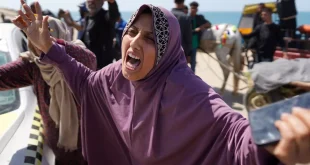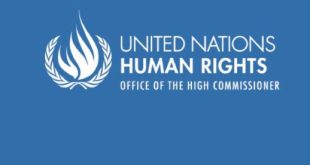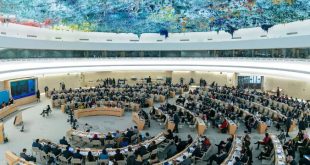The overthrow of Bashar Al Assad is a historic victory for the Syrian people, but it is also a reminder of the immense suffering they endured. As the nation embarks on the difficult journey of rebuilding, Syrians and the world must work together to ensure that such a tragedy is never repeated
The dramatic fall of Bashar Al Assad, widely known as the “Butcher of Damascus,” marked the end of over five decades of oppressive rule in Syria. Overthrown last Sunday by the United States-backed Syrian Free Army, Assad’s ouster is a historic moment in the ongoing saga of the Syrian conflict, which has claimed the lives of over half a million people and displaced millions more. The United States reportedly provided logistical support to the opposition forces, enabling their swift victory.
Clashes between regime forces and opposition groups escalated in late November in Aleppo’s western countryside. By November 30, opposition forces had seized control of Aleppo’s city center and established dominance across Idlib province. With regime forces retreating from their positions, the opposition achieved a relatively smooth takeover. One of the most symbolic moments of this triumph was the liberation of thousands of political prisoners from the notorious Sednaya Prison and other detention centers.
As news of Assad’s flight from the country spread, celebrations erupted across Syria. Syrian exiles rushed to the borders of Lebanon and Jordan, eager to reunite with their families after years of separation. Prime Minister Mohammad Ghazi al-Jalali, staying in his home, expressed readiness to ensure governance continuity, offering a semblance of stability in the post-Assad era.
The commander of the Syrian Free Army, Abu Mohammed al-Jelani, emphasized discipline and unity in this historic moment. In a televised address, he urged his forces to protect public institutions, avoid harming private property, and refrain from celebratory gunfire that could endanger civilians. His call for restraint and cooperation sought to project an image of hope and responsibility amid the chaos.
Syria’s decade-long conflict began during the Arab Spring in May 2011, as the Sunni-majority population rose against the Shiite-dominated regime, which represented about 12% of the country. Syrians sought basic human rights and freedom, but instead faced devastating repression. Entire cities, towns, and villages were reduced to rubble, and the economy was obliterated, with losses exceeding $250 billion. The toll on Syrian society was catastrophic: families were torn apart, livelihoods destroyed, and communities displaced.
This unparalleled suffering was exacerbated by foreign intervention. Major powers such as the United States, Britain, France, Russia, and regional players like Iran and Saudi Arabia exploited the uprising to further their geopolitical agendas, turning Syria into a battleground of competing interests.
The Syrian conflict was fueled by the interventions of global and regional powers. The United States and its allies bombed Syria under the pretext of fighting ISIS, a group reportedly created and funded by covert interests to destabilize the region. The airstrikes indiscriminately targeted civilian areas, with devastating consequences. Former U.S. President Barack Obama, British Prime Minister David Cameron, and French President François Hollande all conducted bombing campaigns that resulted in massive civilian casualties.
Russia’s entry into the conflict in September 2015 marked a new level of brutality. Under the leadership of President Vladimir Putin, Russian airstrikes targeted hospitals, schools, and civilian infrastructure. Human Rights Watch and Amnesty International accused Russia of war crimes, including the use of cluster munitions and white phosphorus, in clear violation of international law. Russia’s alignment with Iran further solidified Assad’s grip on power during the war, even as their actions decimated Syria’s population and infrastructure.
Saudi Arabia and Iran, two regional rivals, also played significant roles. Saudi Arabia funded and armed rebel groups to install a pro-Saudi government, while Iran, through its Quds Force, supported Assad’s regime to preserve its regional influence. Both countries contributed to the sectarian divide, transforming Syria into the epicenter of Sunni-Shia tensions.
The Syrian civil war is regarded as the worst humanitarian crisis of the 21st century. Over half of Syria’s pre-war population—more than 11 million people—were either killed or displaced. Refugees poured into neighboring countries like Turkey, Lebanon, and Jordan, often enduring dire conditions in overcrowded camps. Many attempted perilous journeys across the Mediterranean, hoping to find safety in Europe, but thousands perished at sea.
Inside Syria, life was equally harrowing. Families risked their lives to flee besieged cities, navigating sniper fire and military checkpoints. Young men were often conscripted by force, while others were imprisoned or executed. Amid this despair, the overthrow of Assad offered a glimmer of hope for a nation desperate for change.
Assad’s fall highlights the broader geopolitical designs at play in the Middle East. Analysts have long pointed to the “Plan for a New American Century,” a strategy devised by U.S. neoconservatives, as a blueprint for destabilizing the region. Retired U.S. General Wesley Clark famously revealed in 2007 that the United States planned to target seven countries, including Syria, Iraq, and Iran, to reshape the Middle East.
Israel, widely seen as the principal beneficiary of Syria’s destruction, played a quiet yet strategic role. The dismantling of Syria’s chemical weapons program eliminated a major threat to Israeli security, while the disintegration of Syria ensured that no unified opposition could challenge Israel’s dominance in the region. Critics argue that the chaos in Syria is part of a broader plan to create a “Greater Israel” by dividing the Middle East into smaller, weaker states.
While global powers dominated the conflict, regional actors like Saudi Arabia and Iran contributed to Syria’s suffering. Saudi Arabia’s funding of rebel groups aimed to counter Iranian influence, while Iran’s unwavering support for Assad ensured the regime’s survival. Both nations prioritized their geopolitical rivalries over the well-being of ordinary Syrians, deepening the country’s sectarian divide and prolonging the conflict.
The fall of Assad marks a turning point, but the road to recovery is fraught with challenges. Syria remains fragmented, with various rebel groups, terrorist factions, and international forces vying for control. The Syrian Free Army’s leadership faces the monumental task of rebuilding a nation devastated by war. Restoring basic services, resettling displaced populations, and fostering national unity will require unprecedented effort and international support.
Furthermore, the geopolitical dynamics that fueled the conflict are unlikely to disappear. Regional and global powers may continue to exert influence, potentially undermining Syria’s sovereignty and stability. The legacy of foreign intervention, sectarian violence, and economic ruin will haunt Syria for years to come.
The Syrian civil war serves as a cautionary tale about the dangers of foreign intervention and the human cost of power struggles. As Syrians celebrate the end of Assad’s rule, the world must remember the lessons of this tragedy. The international community has a responsibility to support Syria’s reconstruction, ensure justice for war crimes, and prevent future conflicts driven by geopolitical ambitions.
The overthrow of Bashar Al Assad is a historic victory for the Syrian people, but it is also a reminder of the immense suffering they endured. As the nation embarks on the difficult journey of rebuilding, Syrians and the world must work together to ensure that such a tragedy is never repeated.
Post Disclaimer | Support Us
Support Us
The sailanmuslim.com web site entirely supported by individual donors and well wishers. If you regularly visit this site and wish to show your appreciation, or if you wish to see further development of sailanmuslim.com, please donate us
IMPORTANT : All content hosted on sailanmuslim.com is solely for non-commercial purposes and with the permission of original copyright holders. Any other use of the hosted content, such as for financial gain, requires express approval from the copyright owners.
 Sri lanka Muslims Web Portal Sri Lanka Muslims News Center
Sri lanka Muslims Web Portal Sri Lanka Muslims News Center
 Donate
Donate


